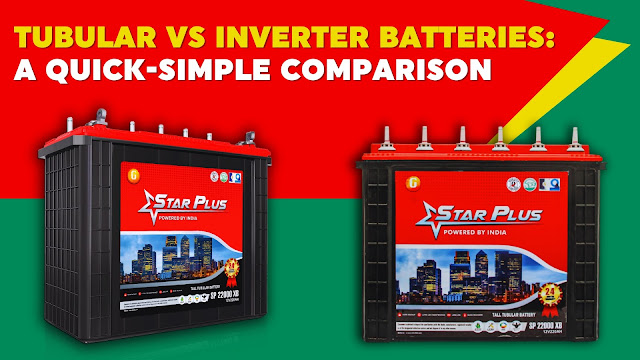Frequent power outages can be quite frustrating. In such conditions, performing your daily errands at home or the workplace may take longer hours. Imagine running the mixer grinder, and suddenly, a power cut occurs. In such a disturbing situation, you wait for hours only to cook the dish or prepare it later.
This might also disrupt
your regular office routine. Experiencing a complete system shutdown not only
stops the work but also delays it. As a result, your employee either waits for
hours to complete the work. This further hampers their productivity.
So, as a responsible home
or office owner, investing in a good battery is your key duty. If you plan to
buy a tubular inverter battery, the following are the maintenance tips and
hacks. Let's learn how to keep your tubular inverter batteries last
longer.
Appropriate
Installation is the Key to Keep it Long-Lasting
Installation is the
foundation point from which issues may begin. If your inverter is installed
incorrectly, future issues may arise. Since then, the battery's durability has
been questioned. So, keep the battery in a well-ventilated area.
Note that it should be
free from direct heat and sunlight. That way, you can reduce the temperature
that would otherwise result in internal damage. Always rely on a proficient
expert for the Installation.
Maintain
Proper DOD or Depth of Discharge
Now, what do you mean by
DOD? Simply put, it refers to the percentage of the battery's capacity used
during the discharge cycle. You must always aim to avoid draining the battery
below 50% of its capacity.
Notably, deep discharge
may create excessive stress inside the battery's internal system and shorten
its longevity. So, you must always monitor the inverter's battery level
indicator and recharge as soon as it reaches 50%.
Avoid
Overcharging
Did you know both
undercharging and overcharging may cause damage to the battery? So, it's a
great practice to check your charger's settings and ensure it is compatible
with the tubular battery's model.
You can contact a
professional or read the manual to understand more about currents and voltages.
Even if the battery isn't in use, you should keep it connected to the charger
for a longer lifespan.
Think of
the Temperature
Extreme temperatures (cold
or hot) may impact the lifespan of your battery. So, your job is to store the
inverter battery in a well-ventilated place. Ensure the area is dry and cold,
with an ambient temperature between 20 and 25 degrees Celsius. It should be
stored away from direct sunlight.
Keep it
Clean
Dirt and dust accumulation
on your battery terminals may hinder conductivity and result in corrosion. So,
you must give importance to periodic cleaning. Use a water solution and baking
soda for the purpose.
When done, use clean water
to rinse it thoroughly and dry it. Never keep them connected to the battery
while cleaning those terminals. This may result in electrical hazards.
Disconnect it before cleaning the terminals; otherwise, you may experience
electrical shocks.
Regular
Visual Inspection
Have you checked for noticeable
signs of damage on your battery, such as bulges, leaks, or cracks? Such
indications may result in internal issues, which require immediate professional
attention. So, always keep an eye on your battery. A visual inspection may help
catch issues earlier and prevent more significant electrical hazards in the
future.
A Few
Good Maintenance Hacks
Run your inverter battery
more confidently at home or the workplace by keeping the following hacks in
mind:
- Check Water Levels
Compared to car batteries,tubular batteries use a liquid electrolyte solution to function. The water
evaporates naturally over time. So, it's imperative to check the water levels
of your battery cells.
You can use distilled
water to top up because other types of water may contain minerals that harm the
internal components. It's best to use distilled water as it's pure and clean.
Undermining the watering routine may result in reduced battery capacity and
shorter lifespan.
- Terminals and Cables
The battery cables and
terminals keep the inverter running seamlessly. However, a minor issue in the
connection may result in wear and tear in the future. Regular inspection of the
cables and terminals is effective for signs of damage and corrosion.
One quick note: A white or greenish
buildup indicates corrosion, while cracks, loose connections, and cuts suggest
damaged cables. They can pose electricity hazards and hinder conductivity.
As soon as you notice such
issues, you must clean the corrosion using baking soda or replace the damaged
parts.
Wrapping
up
Your inverter battery is a
significant element of the backup power system. Following the above steps
ensures the tubular battery remains functional for years. Always remember that
a well-maintained battery offers long-lasting performance and ensures optimal
safety. So, if you plan to buy an inverter in Lagos, please follow
these tips and hacks to maintain your battery and maximise its lifespan.








